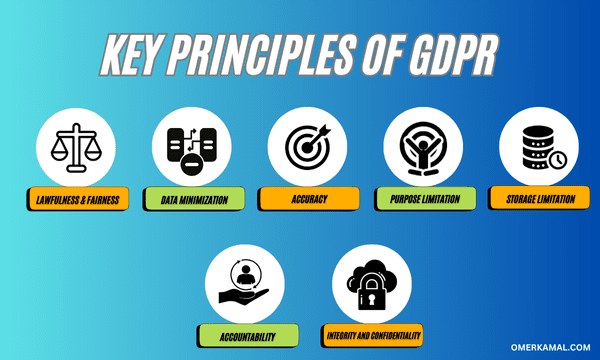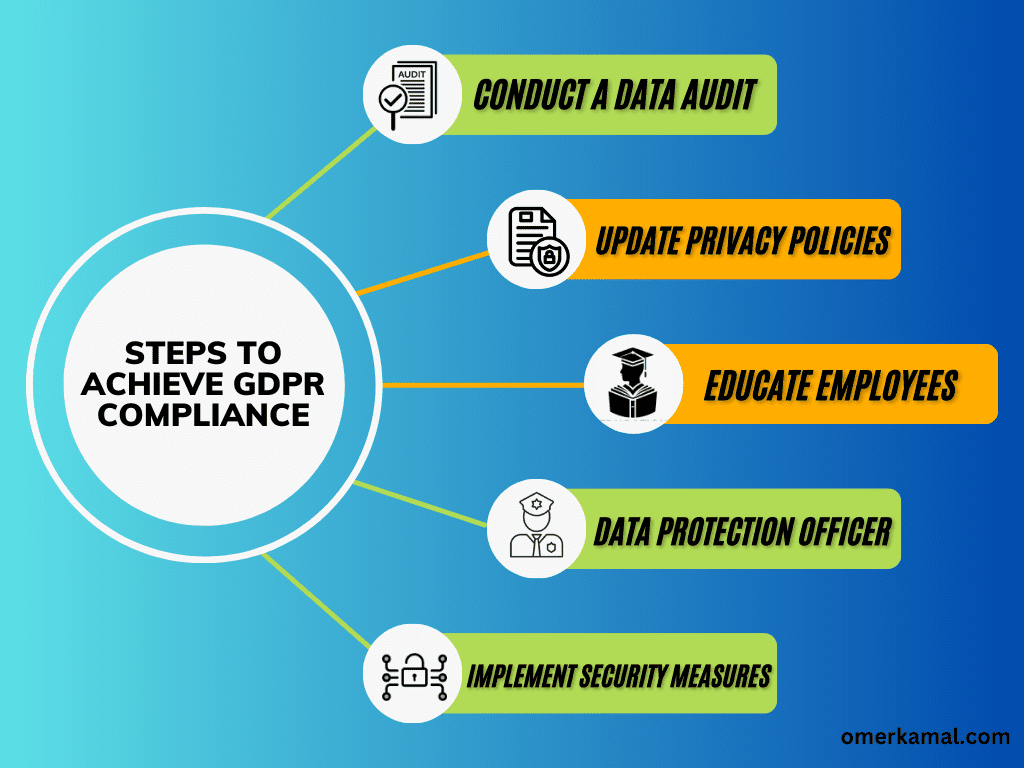GDPR Compliance: In an era where data drives business innovation and growth, adhering to GDPR compliance has never been more critical. The General Data Protection Regulation (GDPR) stands as one of the most significant regulations in the field of data privacy, shaping how organizations handle, store, and process data. Complying with GDPR isn’t just a legal necessity—it also brings numerous benefits for businesses and individuals alike.
Understanding GDPR and Its Significance
The GDPR is a regulation enacted by the European Union to protect personal data and privacy for individuals within the EU. It applies to any organization that collects or processes the personal data of EU citizens, regardless of its location. GDPR’s primary objective is to give individuals more control over their data while ensuring organizations handle this information responsibly.
Data protection is essential for businesses in all sectors, from small startups to global corporations. With data breaches and cybercrimes on the rise, GDPR compliance protects organizations from legal penalties and reputational harm. Beyond legal requirements, adherence to GDPR demonstrates a commitment to ethical data practices, fostering trust and confidence among customers and stakeholders.

Key Principles of GDPR
To understand the importance of GDPR, it’s crucial to grasp its key principles:
- Lawfulness, Fairness, and Transparency
Organizations are required to handle personal data in a manner that is both fair and transparent. This includes informing individuals about why and how their data will be used.
- Purpose Limitation
Data should only be collected for specific, legitimate purposes and not processed for unrelated activities.
- Data Minimization
Only the necessary data for achieving the intended purpose should be collected. Excessive data collection raises risks and complicates compliance.
- Accuracy
Personal data must be kept accurate and up-to-date, ensuring individuals are not negatively impacted by outdated information.
- Storage Limitation
Data should not be stored longer than required. Retention policies help maintain compliance and reduce data storage costs.
- Integrity and Confidentiality
Organizations must safeguard personal data against unauthorized access, breaches, and other risks through robust security measures.
- Accountability
Businesses are accountable for their compliance efforts, which include maintaining records, conducting regular audits, and demonstrating adherence to GDPR principles.
Why GDPR Compliance Matters for Businesses
1. Protects Sensitive Data
The GDPR mandates that organizations adopt rigorous security protocols to safeguard personal data. From encryption to secure storage systems, these measures reduce the likelihood of data breaches that can compromise sensitive information.
2. Builds Customer Trust
Trust is a critical factor for business success. Customers today are highly conscious of how their data is used. Organizations that follow GDPR guidelines demonstrate transparency and responsibility, building stronger customer relationships and brand loyalty.
3. Minimizes Legal Risks
Failure to adhere to GDPR can result in substantial penalties, such as fines reaching €20 million or 4% of global annual revenue. Beyond financial loss, businesses may also face reputational damage, leading to reduced customer confidence and lost opportunities.
4. Encourages Better Data Management
GDPR compels businesses to streamline their data management processes. By limiting data collection and maintaining organized records, companies can operate more efficiently while ensuring compliance. This structured approach can also reduce storage costs and improve operational effectiveness.
5. Strengthens Cybersecurity
Adopting GDPR’s security requirements, such as encryption and regular audits, enhances an organization’s ability to defend against cyber threats. A proactive approach to cybersecurity reduces vulnerabilities and protects both customers and the business.
Benefits of GDPR Compliance
1. Enhanced Reputation and Competitive Edge
Organizations that prioritize data protection set themselves apart in competitive markets. GDPR compliance demonstrates a business’s dedication to privacy, earning respect from customers and partners.
2. Global Compatibility
Even though GDPR is an EU regulation, its influence is global. Businesses that comply with GDPR are better positioned to meet similar privacy laws worldwide, such as California’s CCPA, enhancing their global market reach.
3. Empowered Customers
GDPR empowers individuals with right to access, correct, or delete their data. By respecting these rights, businesses foster transparency and accountability, which resonate positively with modern consumers.
4. Improved Incident Management
GDPR emphasizes the importance of having a robust incident response plan. Companies must act swiftly to notify authorities and affected individuals in case of a breach. This preparedness not only minimizes damage but also demonstrates reliability and compliance.

Steps to Achieve GDPR Compliance
- Conduct a Data Audit
Understand what data you collect, how it is stored, and why it is processed. This clarity is the first step toward compliance.
- Update Privacy Policies
Clearly outline how data is collected, processed, and protected in privacy policies. Transparency enhances trust and lowers legal risks.
- Implement Security Measures
Safeguard personal data with encryption, firewalls, and access controls. Regularly review and update security protocols.
- Appoint a Data Protection Officer (DPO)
For businesses engaged in large-scale data processing, appointing a DPO ensures dedicated oversight of compliance efforts.
- Educate Employees
Train your team about GDPR requirements and best practices. Employees play a vital role in maintaining compliance.
- Develop a Breach Response Plan
Be prepared to handle data breaches by defining clear roles and steps to mitigate damage. Swift action is critical for compliance and trust.
Embracing a Future of Data Protection
GDPR compliance is not just a legal obligation—it’s a chance to foster a culture of trust and responsibility. By adopting GDPR principles, businesses can protect themselves, their customers, and their reputations in an increasingly data-driven world. Prioritizing data protection not only aligns with legal standards but also sets the stage for sustainable growth and innovation.
For businesses navigating GDPR compliance, the journey may seem challenging, but the rewards—enhanced trust, better data practices, and competitive advantage—are well worth the effort.
If you want to get the best agency to grow your business, please visit this website : Blsconsult.com
Learn More : Business Laws in Germany: 6 Key Legal Rules for Entrepreneurs








